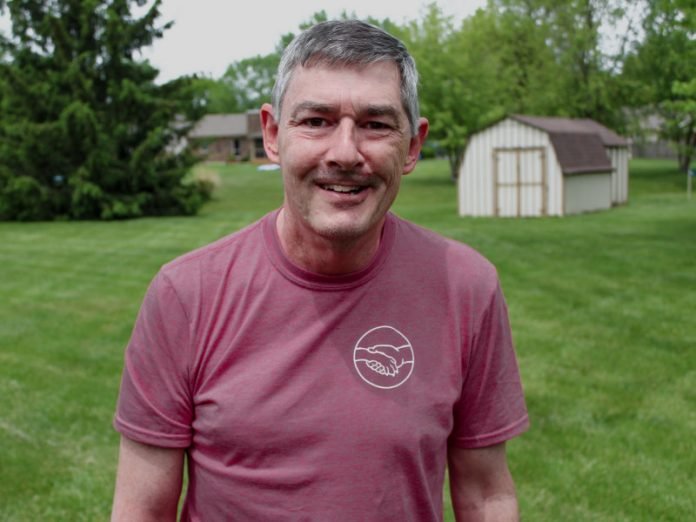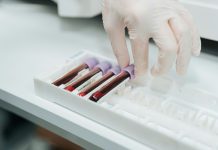
In the more than 30 years he worked as a dispatcher for a relative’s trucking company, Andy Thoman was never late.
So when his sister, Amy Brammer, discovered he hadn’t made it to his job, she knew something must be wrong.
“If he was going to be someplace, he would have let me know,” she said.
Already on her way to work, Brammer instead drove to Thoman’s house near Indianapolis. A cousin met her there. They found his back door open and his dog, Alex, an American Dingo, in the backyard.
Fearing the worst, they entered the house and found the bathroom door closed. When they tried to open it, they realized Thoman was slumped against the other side.
Paramedics arrived within minutes, forcing the door open and loading Thoman into the ambulance. At the hospital, doctors told Brammer her brother was having a hemorrhagic stroke; he needed brain surgery.
This was June 2020. Because of the pandemic, Brammer couldn’t go to the hospital. Communication instead was done via videoconferencing.
Seeing Thoman on the screen was tough for Sophia Shock; her dad and Thoman were such close, longtime friends that she considered Thoman her uncle and he considered her a niece.
“He couldn’t lift his head or track with his eyes,” Shock said.
But when she asked Thoman to blink if he could understand her, he did.
“That was the first real sign of hope,” she said.
The stroke’s effects soon became clear. Thoman couldn’t speak, write or clearly communicate, a condition called aphasia. His motor skills were also affected, and his right side was paralyzed.
Ten days later, Thoman was transferred to a rehabilitation hospital. He stayed there for six weeks, engaging in intense speech, physical and occupational therapy.
It paid off. Andy soon stood by himself. Several weeks later, he walked up a flight of stairs.
Thoman next went to a subacute care facility, where he continued to make strides. Brammer said at the end of a therapy session, Thoman would jokingly argue with the therapists, wanting to keep pushing himself.
During one session, the therapist asked Thoman to walk from his chair to a point across the room. When the therapist turned his back for a second, Thoman pushed his chair back another 20 feet.
“He’s a fighter,” Brammer said.
As Thoman’s medical bills continued to mount, Brammer was concerned. Her desire for quality home health care and therapy for years to come led her to begin thinking about selling some of his personal items. Shock had a better idea.
She had been taking care of his dog, Alex, since his stroke. One day, she noticed Alex’s bandana and, on a whim, decided to make and sell her own.
Her fiancé, who had taken a sewing class in school, taught her the basics of sewing. After completing a few bandanas, she posted a video to TikTok, showing off her creations and sharing Thoman’s story.
Two days later, the post went viral, racking up 70,000 views and thousands of comments. Soon the orders rolled in – $11,000 worth in two weeks.
A few weeks later, Shock told Thoman about the bandanas.
At first, he was confused. When she showed him the TikTok video, he started crying. Then the whole family broke down in tears and embraced one another.
“It was a moment I’ll never forget,” Shock said.
Together, she and Thoman started an online business. They’ve expanded their product line to include T-shirts drawn by Andy, pet bandanas and matching scrunchies, and cane covers.
His drawings and writings are more impressive considering he was right-handed before the stroke but has had to learn to write with his left hand. A portion of the proceeds supports stroke-related charities.
Thoman threw himself into the budding business, working from a card table in the retirement facility where he is living until he’s strong enough to go home.
He writes thank-you notes to every customer and answers the letters of support he receives.
He and Shock have regular video calls, finding a way to communicate despite the aphasia preventing him from speaking in full sentences.
“He wants to know all the details and always gives his input,” Shock said.
The business, she said, has “given us both a purpose, and it’s something we can do together. It’s been really, really hard at times, but it’s also been such a beautiful experience.”
Written by Tate Gunnerson.
If you care about stroke, please read studies about why sleep loss could increase your heart disease and stroke risk and findings of this antioxidant may prevent second stroke and heart attack.
For more information about stroke and your health, please see recent studies about big fluctuations in these 4 things linked to heart disease, stroke and results showing that this drug combo may reduce stroke risk effectively.



